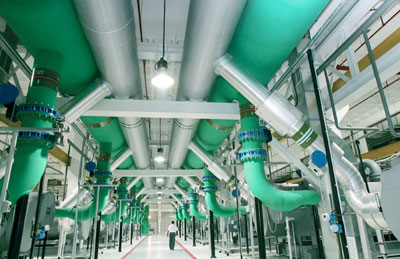
Saudi set for big district cooling growth
Dubai, September 10, 2012
Saudi is set to account for more than 50 per cent of the Gulf region's district cooling operating capacity and 33 per cent of overall revenue by 2016, at a compound annual growth rate (CAGR) of 21.7 per cent, according to a report.
The Kingdom is spearheading the region’s emerging trend towards adoption of alternative and renewable sources of energy, said top consulting firm Frost & Sullivan in a recent study titled ‘Energy Efficiency in Saudi Arabia.’
With strong renewable energy resource base and constant technological developments, Saudi has ambitious plans to improve energy efficiency by effectively using existing systems and encouraging use of energy-efficient products.
In 2010, the government had set up the Saudi Energy Efficiency Board (SEEC) as power efficiency was identified as a national priority.
Among others, an objective of SEEC was to propose a national energy-efficiency plan in order to rationalise energy usage in the country. Thus, Saudi's first grid connected solar power plant was inaugurated in 2011, said the report.
The construction boom and rising investments in real estate in the Kingdom have resulted in phenomenal growth for building technologies such as heating ventilation and air-conditioning (HVAC), lighting, and mechanical-electrical-plumbing (MEP) systems in recent years, the report stated.
As all these systems operate on electricity, Saudi’s energy consumption has inevitably surged rapidly over past few years.
Additionally, economic growth across sectors such as petrochemicals and plastics, power, water and wastewater, infrastructure, and metals and mining, has contributed to increased energy consumption.
According to Frost & Sullivan, in 2011, the energy consumption pattern in Saudi Arabia was dominated by its residential sector with 54 per cent of total energy consumption, followed by commercial sector with 29 per cent, and industrial sector with 17 per cent.
The Kingdom offered over $1.35 billion of energy-saving potential and out of this about $1 billion is an immediate addressable market potential for energy efficiency.
Currently, Saudi accounts for $1.44 billion of untapped energy-saving market, which translates to about 37.1 bn kWh of energy saved, the report added.
Frost & Sullivan pointed out that Saudi was the highest waste generator in the GCC, which was recorded at approximately 22 million tones in 2011.
Availability of cheap fossil fuel and low landfill rates, however, have been hindering growth of waste-to-energy and recycling market in the country, the research firm said in its report.
The rise in energy consumption must be addressed by developing new techniques for energy efficiency, the study pointed out.
Frost & Sullivan said there was a need to upgrade existing systems including controls, sensors, building management systems, and performance contracting models, along with harnessing energy-efficient products and systems to help rationalise energy consumption in the country.
Some techniques that can support energy-efficiency measures are HVAC, lighting, integrated building management systems (IBMS), performance contracting, and recycling, the report said.
Phasing out inefficient lighting systems with energy-efficient compact fluorescent lamp (CFL) and light-emitting diode (LED) lights is further expected to reduce annual electricity consumption by 3.2 Twh and CO2 emissions by 2.4 Mt, it added.
Frost & Sullivan environmental and building technologies industry manager Kumar Ramesh said, "Greener equipment should start making inroads into the Saudi market. If Saudi implements energy-efficiency programmes as proposed by the electricity advisor, demand for products such as programmable thermostats, energy-efficient HVAC equipment, and other associated services and solutions is expected to increase."
However, a critical challenge to development of the Saudi energy-efficiency market is lack of awareness amongst end users, said the expert.
To address this, Saudi must implement mandatory regulations on energy management and incentives for energy-efficient investments in order to generate awareness.
"It is also essential to include efficiency standards for new air-conditioning appliances, along with actions on replacing inefficient models and regulation on maintenance," Ramesh noted.
Also the Kingdom needs to incentivise implementation of new technology to reduce energy consumption, provide more autonomy to energy-related organisations to work towards efficiency, create awareness about the need to conserve energy, and educate end users with respect to increasing energy prices, he added.-TradeArabia News Service







